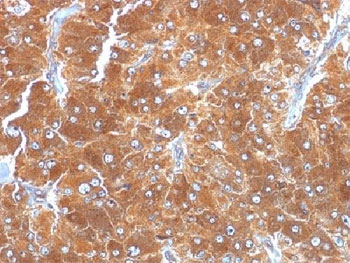- Tel: 858.663.9055
 Email: info@nsjbio.com
Email: info@nsjbio.com
- Tel: 858.663.9055
- Email: info@nsjbio.com
Adipophilin Antibody reagents target adipophilin, also known as perilipin-2 (PLIN2), a lipid droplet-associated protein critical for lipid storage, metabolism, and energy regulation. As a member of the perilipin family, adipophilin coats the surface of lipid droplets and regulates their formation, stabilization, and turnover.
Adipophilin is expressed in many tissues but is most abundant in cells that actively metabolize lipids, such as adipocytes, hepatocytes, and macrophages. It plays a central role in triglyceride storage and mobilization, providing energy during fasting and protecting cells from lipotoxicity during nutrient excess. Dysregulation of adipophilin has been linked to obesity, type 2 diabetes, fatty liver disease, atherosclerosis, and cancer, making it a key biomarker and therapeutic target.
Because of its importance, the Adipophilin Antibody is indispensable for lipid biology, metabolic disease, and translational pipelines. The Perilipin 2 Antibody extends these applications with reproducible detection across multiple assay systems.
NSJ Bioreagents provides Adipophilin Antibodies validated for immunohistochemistry (IHC), western blotting (WB), immunofluorescence (IF), flow cytometry (FACS), and ELISA. Each antibody undergoes rigorous testing for specificity, reproducibility, and cross-platform performance.
Benefits include:
Assay Versatility: Compatible with tissue, cell culture, and biochemical assays.
Lipid Biology Relevance: Targets a protein central to lipid droplet biology.
Reproducibility: Guaranteed batch-to-batch consistency.
Detailed Documentation: Protocols, controls, and validation data provided.
Translational Value: Suitable for biomarker studies and clinical pipelines.
By choosing NSJ Bioreagents, researchers ensure their Adipophilin Antibody reagents deliver clarity and reproducibility across lipid and metabolic studies.
The Adipophilin Antibody supports wide-ranging applications in lipid biology, metabolism, and translational research.
Detect adipophilin expression on lipid droplet surfaces.
Support studies of droplet biogenesis, stabilization, and turnover.
Clarify roles in triglyceride storage and fatty acid metabolism.
Provide translational biomarkers for lipid storage disorders.
Adipophilin Antibody detects expression during adipogenesis.
Support research into obesity and fat metabolism.
Provide biomarkers for adipocyte differentiation and lipid accumulation.
Extend into translational pipelines for obesity-related disease.
Detect adipophilin in hepatocytes during fatty liver disease.
Support research into non-alcoholic fatty liver disease (NAFLD).
Provide translational biomarkers for liver steatosis progression.
Extend into metabolic syndrome and hepatology pipelines.
Adipophilin Antibody detects lipid accumulation in macrophages (foam cells).
Support studies of atherogenesis and vascular lipid storage.
Provide biomarkers for cardiovascular disease progression.
Extend into translational cardiovascular research.
Detect adipophilin expression in tumors with high lipid metabolism.
Support studies linking lipid droplets to tumor growth and survival.
Provide biomarkers for metabolic reprogramming in cancer.
Extend into translational oncology pipelines.
Adipophilin Antibody detects lipid storage in macrophages and dendritic cells.
Support studies linking lipid metabolism to immune function.
Provide biomarkers for metabolic-immune crosstalk.
Extend into translational immunology research.
Detect adipophilin expression during stem cell differentiation.
Support studies of lipid metabolism in development.
Provide markers for differentiation toward adipogenic or hepatic lineages.
Extend into regenerative medicine and metabolic engineering.
Adipophilin Antibody provides biomarkers for metabolic syndrome, obesity, and fatty liver disease.
Supports diagnostics for lipid metabolism disorders.
Ensures reproducibility in biomarker-driven clinical pipelines.
Bridges basic lipid biology with translational medicine.
Adipophilin is a molecular marker of lipid droplet biology, linking metabolism, inflammation, and disease. The Adipophilin Antibody equips researchers to explore lipid storage, mobilization, and signaling across diverse biological contexts.
In metabolic disease research, it clarifies how lipid droplet regulation contributes to obesity, diabetes, and fatty liver disease. In cardiology, it supports studies of foam cell formation in atherosclerosis. In oncology, it reveals how tumor cells exploit lipid metabolism for growth and survival. In immunology, it provides insights into immune cell lipid regulation.
Clinically, adipophilin expression is being investigated as a biomarker for fatty liver, metabolic syndrome, and lipid-driven cancers. Reliable Perilipin 2 Antibody reagents ensure reproducibility and translational value across research and clinical applications.
Adipophilin is a central regulator of lipid droplet biology, metabolism, and disease. The Adipophilin Antibody provides validated reagents for obesity, fatty liver, atherosclerosis, cancer, and translational pipelines, while the Perilipin 2 Antibody complements these studies across diverse assays. By ensuring specificity, reproducibility, and assay versatility, these antibodies remain indispensable for advancing lipid biology and improving clinical outcomes.

IHC testing of FFPE human adrenal tissue with ADRP antibody (clone ADFP/1494, cat # V3207). Required HIER: steam sections in pH6, 10mM citrate buffer for 10-20 min.
